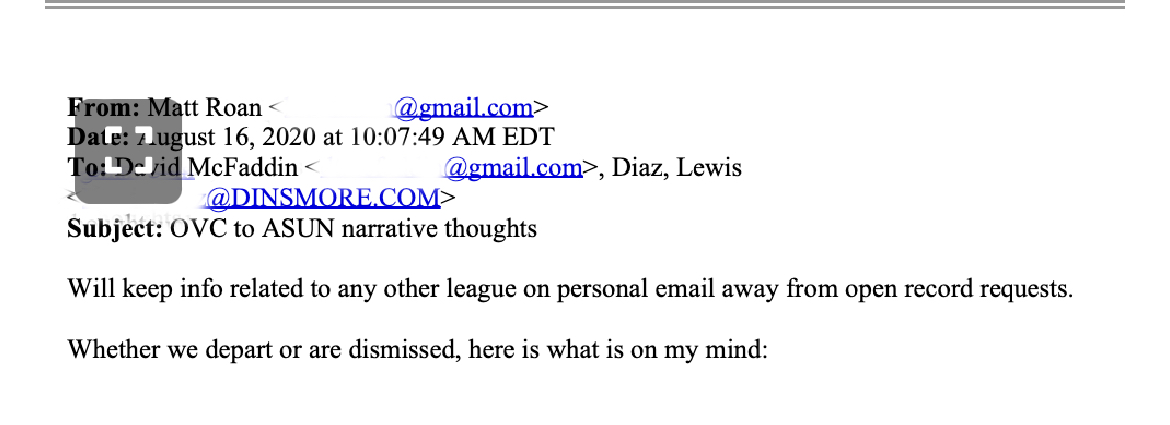
On January 11, Richmond Register editor Ricki Pryor and sports editor Nathan Hutchinson reported on records disclosed in discovery in "a lawsuit against Eastern Kentucky University by the Ohio Valley Conference [that] shows school leaders agreed to use personal email accounts when discussing the university’s plan to leave the OVC with the intent to keep that information secret and away from potential open records requests."
Not since University of Louisville officials coordinated their efforts to avoid public scrutiny of a "deferred compensation" plan that "handed out more than $20 million in extra pay to about a dozen high-ranking administrators over the years" -- by using misleading code names to describe the plan and destroying computer hard drives -- has clearer evidence of a university's evasion of the open records law been presented.
http://www.wdrb.com/story/34520485/u-of-l-foundation-racks-up-over-20-m…
https://www.courier-journal.com/story/news/2017/06/09/u-l-foundation-sc…
In 2008, it was “to keep these [deferred compensation] participation agreements from being subject to ORR [open records requests]. Dr. Ramsey does not want any of these to end up in the hands of the C-J [Courier-Journal].”
In 2023, it is an August 16, 2020, email "to the private Gmail accounts of EKU President David McFaddin and former EKU Board of Regents Chair Lewis Diaz, [from] EKU Athletic Director Matt Roan [which] states, 'Will keep info related to any other league on personal email, away from open record requests' [to which] Diaz responded, 'Agreed,' one day later.”
The difference between EKU's conduct in 2020 and UofL's conduct in 2008 -- other than obvious differences in the the nature of the public records secreted away from public view and the mechanism employed for secreting them away -- is a 2021 open records decision issued by Attorney General Daniel Cameron -- and subsequent decisions -- that arguably gives EKU legal cover for denying the public access to those public official discussions of public business on their private e-mail accounts.
https://www.ag.ky.gov/Resources/orom/2021/21-ORD-127.pdf
Cameron's decision is based on an exceedingly narrow interpretation of the definition of "public records" that extends to records in the physical possession of a public agency •only•. It is a definition that would arguably enable a public official to treat as a nonpublic record damning documentary evidence of official malfeasance by placing the only copy of the document in a personal file cabinet in his or her personal residence.
Willful concealment of a public record? Yes.
But first the official must be caught in the act.
The electronic "smoking guns" in 2008 and 2020 were emails suggesting ways to avoid open records request. Were it not for the 2017 audit of the UofL Foundation and the 2022 discovery order in OVC v EKU, these efforts to evade public scrutiny may have achieved there stated goal -- avoidance of public accountability through an open records request.
The current Attorney General's interpretation of "public record" is at odds with decades of Kentucky Attorney General interpretation. Past decisions, save one, are based on a Kentucky Court of Appeals opinion recognizing that, "[i]n the end, it is the nature and purpose of the document, not the place where it is kept, that determines its status as a public record. 66 Am. Jur.2d Records and Recording Laws, §3 (1973)."
https://cases.justia.com/kentucky/court-of-appeals/1999-08-12-1998-CA-0…
It is a position recognized in legal treatise and implemented by statute, caselaw, or both, in other states. It is a position that the current Attorney General has opted to ignore. And it is a dangerous position that promotes discussions of open records avoidance like that proposed, and agreed to, by EKU officials in 2020.
https://www.mercurynews.com/2022/02/08/extremely-disturbing-why-san-jos…
https://www.kcur.org/news/2022-11-15/under-josh-hawley-missouri-attorne…
https://www.tampabay.com/news/florida-politics/2022/12/27/keefe-migrant…
In Kentucky Open Government Coalition v Kentucky Department of Fish and Wildlife Resources Commission, Franklin Circuit Court Judge Thomas Wingate ruled, in 2022, that "records used or prepared by an agency fall within the scope of the Open Records Act regardless of where the record is stored. A possession only approach does not comport with the plain language of KRS 61.870(2) or the general purpose of the Open Records Act."
https://kyopengov.org/sites/default/files/2023-01/Order%20ruling%20on%2…
Wingate went on to differentiate email messages dealing with public business on private devices and accounts from text messages dealing with public business on private devices and accounts. He determined that production of the latter would unreasonably burden the defendant public agency -- the Department of Fish and Wildlife Resources Commission -- and required production of email messages on the commissioners’ private devices and accounts only.
Plaintiff Kentucky Open Government Coalition and it’s attorneys — preeminent First Amendment and open government litigators Jon Fleischaker, Michael Abate, and Rick Adams — welcomed the opportunity to present this "decisive issue" to Kentucky's appellate courts for "ultimate[ ] resol[ution]."
While the open records case proceeds through the appellate court, it behooves public agencies and officials to remember that they risk violation of state laws relating to public records retention/management and tampering with public records when they conduct the public's business on private devices or accounts.
https://xapps.legislature.ky.gov/law/statutes/statute.aspx?id=4878
https://apps.legislature.ky.gov/law/statutes/statute.aspx?id=19864#:~:t….
The Coalition’s position is grounded in decades of well-reasoned legal authority from prior attorneys general (save one) and the courts, derived from legal treatises, and mirrored in cases across the country. It is the only position that ensures the survival of the open records -- and coincidentally -- the open meetings laws.
https://www.richmondregister.com/news/court-records-reveal-eku-official…


